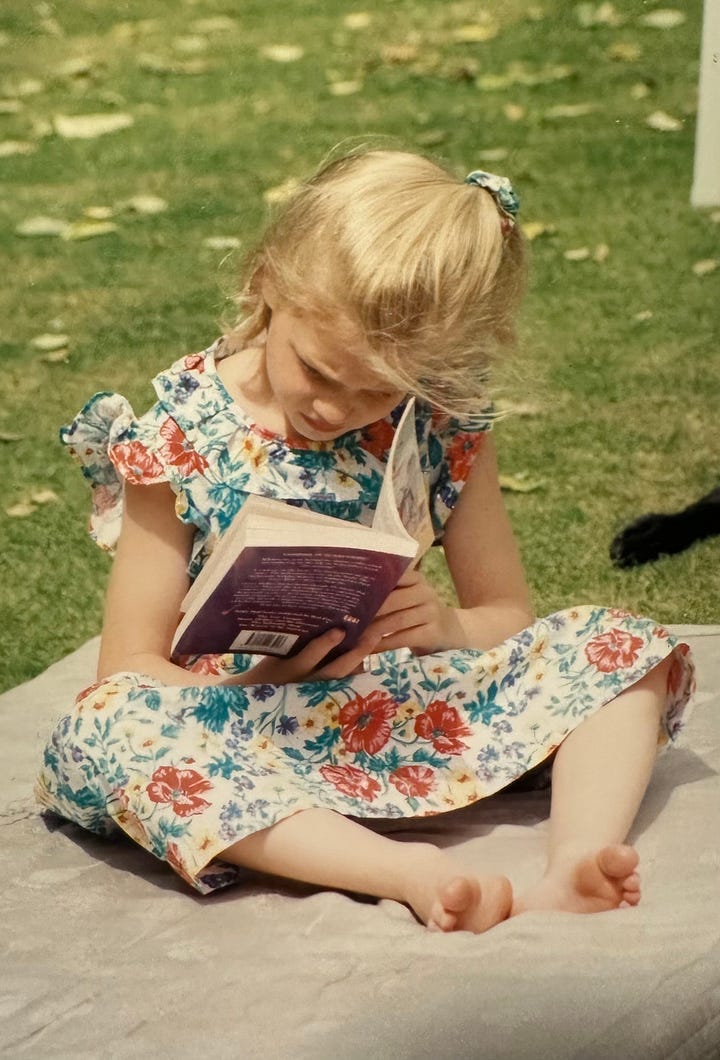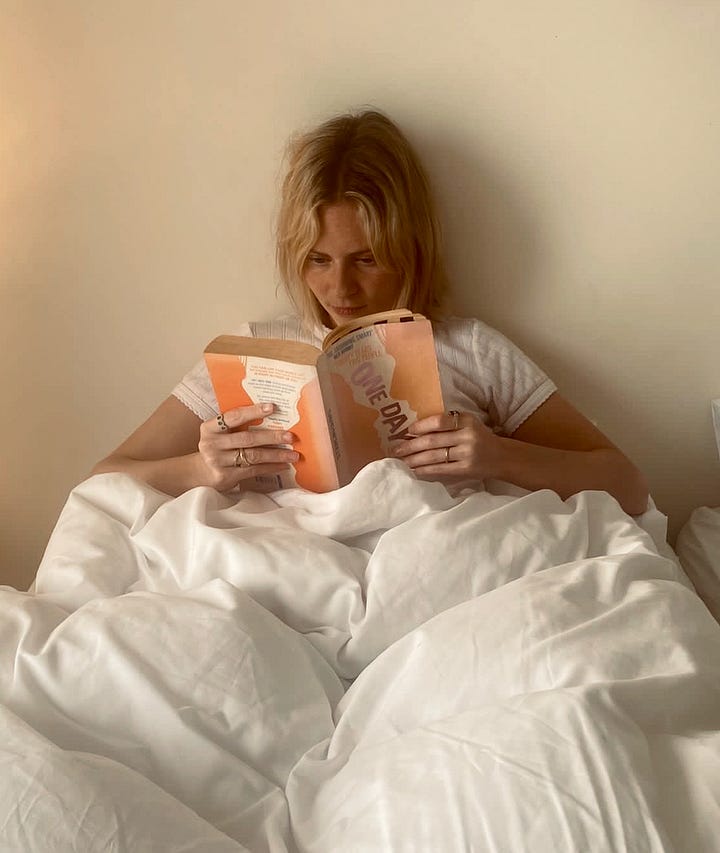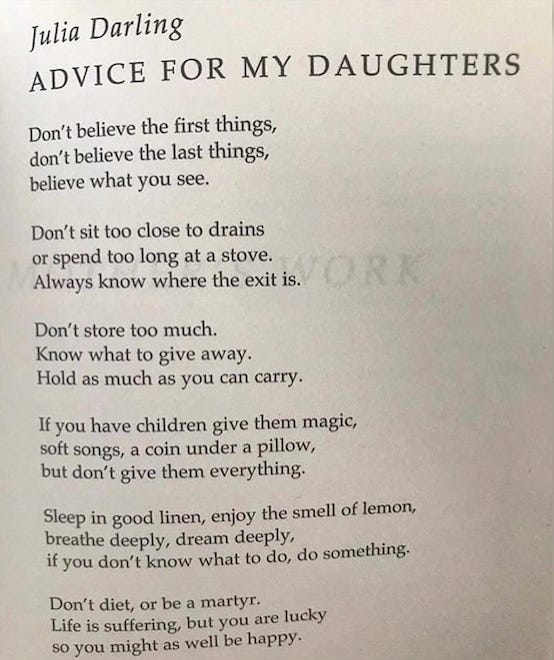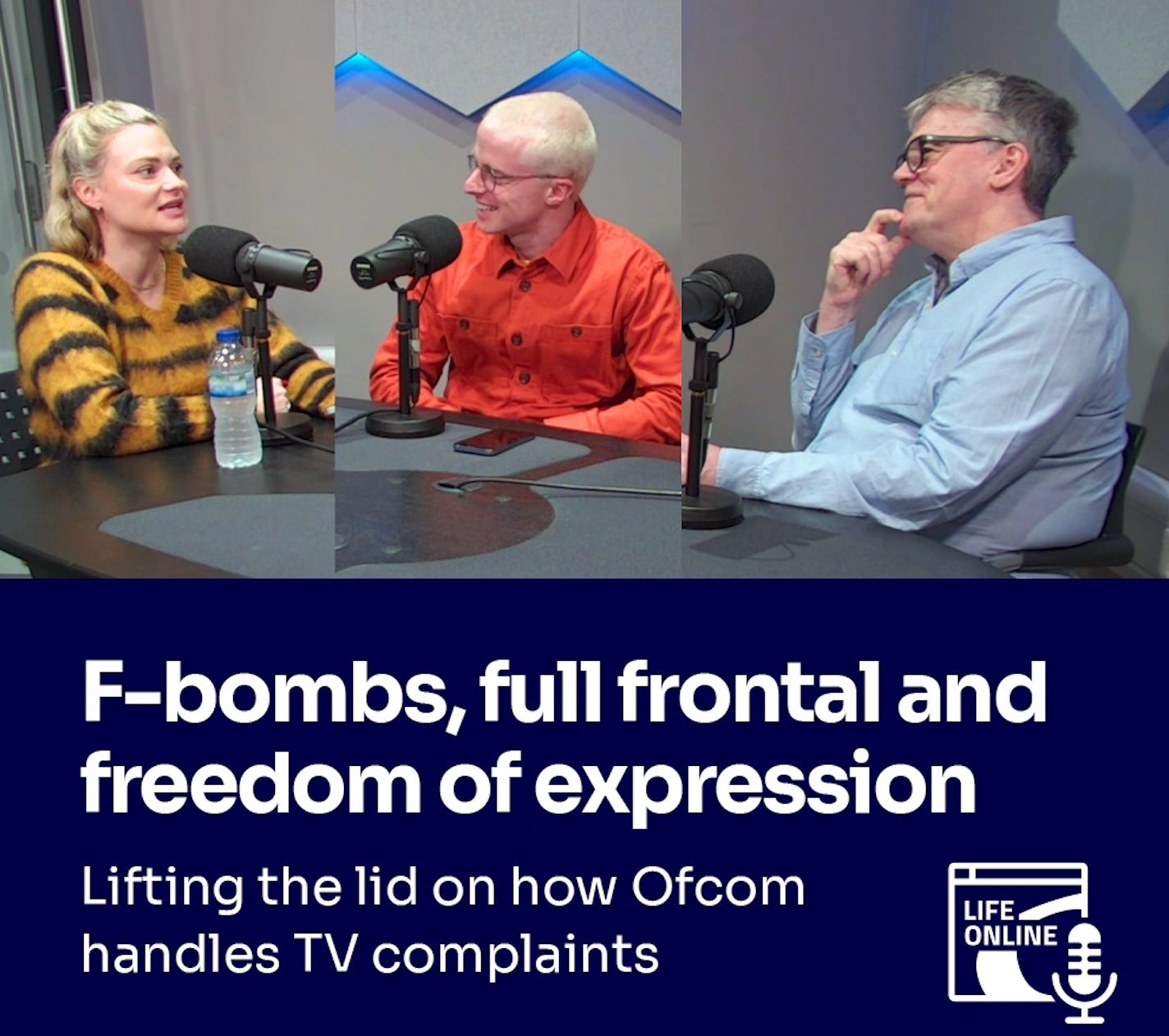But how do you read so much?
Because there are so many other things I DON'T do
The question I am asked most is, how do you read so much? Sometimes it’s mere curiosity, sometimes the query is tinged with frustration. You have kids, ffs!


I get it. It’s annoying to see someone do so much of something that you feel you have no time for. I feel similarly riveted and envious when I see people on IG having the time to do their hair so nicely every day or the time to go to pilates so often. So I am going to try and answer this question as fully and honestly as I can, while musing on this idea of time and why reading is somehow seen as a more productive use of it than other hobbies.
Historically, I’ve shied away from answering this question, because to answer it would be to acknowledge that yes, I do read a lot. And that to do so might imply that I think I’m smart, or diligent, or - perish the thought - well read. (I actually don’t think I’m particularly well read, btw. I read a lot, but have enormous gaps in my literary education.) But pretending I don’t read a lot is like pretending I go spinning every day. It’s an intractable truth.
I have read voraciously - at times bordering on obsessively - since I was tiny. I took a book into every classroom, I read in the cold empty bath after lights out at boarding school, I read in queues and during meals and and on the loo and on the night bus home from a night out. As a child, my mother would take me to the library and we would get out the maximum 14 books. I could easily read for 8 hours a day, aged 9. I fucking loved it. I still fucking love it. I am easily over-stimulated, I have a racing brain, and reading takes me out of myself. It is my self-care, my meditation, my way to find an equilibrium in order to face the world. The novelist Emma Straub puts it perfectly:
My love for books arrived pre-memory. There is no before. Books were always my stalwart companions, my escape hatches, my private joys.
Reading I can do. Reading is perhaps the only thing I know I can do. It’s no more a skill - something I burnish and work at or feel proud of - than it is part of me. As the writer reader Zadie Smith observed in 2011 of her bibliomania:
For me, being a reader, in summer or at any other time, isn't a "lifestyle choice." Rather, I made the choice—if that's what it was—so long ago, it has taken on an inescapable character in my mind. I think that if I were a very good swimmer, I would be proud to be so, but being proud of being a reader, in my case, is like being proud you have feet.
So yes, bestow me no praise for simply doing a lot of something I like doing. As for where I find the time to read - in lieu of giving you an hourly breakdown of my week (cba) I will offer you these transparencies (not!!! tips.)
I do not have a regular exercise routine. Compare this to my husband who exercises between 6am and 7.15am every day. By not doing that (and I should do that! I feel terrible that I don’t look after my body the way someone with muscular problems should) I have myself 75 mins a day, that he does not have, to read.
I do not keep social media on my phone, not because I am holier than thou, but because it makes me a jittery mess and I hate the time it eats. That saves me, say, 30 mins a day? (That’s a conservative estimate, I’d hazard.)
I do not really cook, except for maybe once or twice a week. I heat. Beans on toast, quiche, jacket potatoes, pasta, soup. I eat just fine, but I do not labour over my food for more than 10 mins and in the division of our household labour, my husband very often does the cooking.
I read anytime I travel anywhere. Train, bus, plane - I make a point of getting out a book, not a podcast.
A lot of reading that I do is for work: if I’m interviewing an author on stage, or for a podcast, or for a written interview. When it is work, I will factor that reading into my working day. Ergo, more reading hours.
I watch TV only a few nights a week (this is an insomnia thing as much as a reading thing) and I go out maybe twice a week. At least 3 nights a week I go to bed when my kids do and read for 3/4 hours a night - which, as I am a fast reader, can be the bulk of a 300 page book.
Over the last 5 years, having never once reared its sodding head before the age of 30, insomnia has caused me tremendous amounts of stress and exhaustion and resulted in a veritable shit ton of reading. In a bad bout, I may sleep for only one or two hours a night, which can easily make for a book a night.
This is how I rack up the hours. It’s not the right way to live a life, it’s just the way I live mine. So why does reading come with the moral signifiers that other hobbies do not - the signifiers that make so many people feel bad, when they are not doing it? It’s partly due to articles like this, with its somewhat flattening headline on how reading makes you a better person. To be clear, I do think reading brings enormous benefits. It’s a wonderful way to learn about the world and develop empathy, as well as language. I hope my children love reading - although they may well take after their father, who can count how many books he’s read in the last decade, on one hand - not because I think it will make them any worthier people than if they don’t.
When I hear people with young kids tell me they haven’t read a book for 2 years and they desperately want to, but how can they?? I hear someone who doesn’t need to read to get to sleep (lucky fuckers). I hear someone, perhaps, who likes scrolling through their phone, or watching Netflix every evening, or listening to a podcast series long into the night, or cooking something slow and delicious with a glass of wine in their hand while jazz plays softly in the background. (I want to be that person.) I hear someone, in other words, who has found other ways to feed themselves.
I think, when it comes to our disposable hours, we make time for the things we want to do. I read because it’s what I want to do, frequently to the exclusion of other things. I may think that I want to get into a solid pilates routine, or cook a meal out of a cook book, but in reality, I only want to want to. I will find ways, as I always do, to not do the other stuff, so that I can find time to read. So if you want to want to read, I say don’t force it. As long as you’re finding ways to nourish yourself, cut yourself some slack. Screw the books!
We all have stuff we want to want to do. Maybe when you finally make headway through the book cleaved to the surface of your nightstand, I’ll finally commit to a thrice weekly exercise routine, and my reading will, with its big girl panties on, take a backseat for a while.
BITS
Journalism, pods, docs, tv, film, poems, memes & more
Ozempic, from all angles. A primer for those under a rock: the rocketing use of semaglutide (used for the treatment of type-2 diabetes) as an off-label appetite suppressant has lead to a global shortage of medicine for diabetics - and a raft of gossip about which celebrities are on it. First, the piece many of us had been waiting for - a deep dive into Ozempic (also known as Mounjaro) courtesy of Matthew Schneier for New York Magazine, which came hot on the heels of the gruesomely illustrated NYT piece on ‘Ozempic face’.
Then, the personal piece.
Then, the riposte, by Burnt Toast’s Virginia Sole-Smith. I’m not always a fan of critique-of-the-critique internet commentary, but Virginia’s piece raises such good points about the need to cover diet culture in a meaningful way that doesn’t sound aspirational or hyperbolic. (I went back and re-read both NY Mag and NYT’s pieces after reading her newsletter and I looked at “Everybody is either on it or asking how to get on it,” said Dr. Paul Jarrod Frank, a dermatologist in New York. “We haven’t seen a prescription drug with this much cocktail and dinner chatter since Viagra came to the market” with a whole new wince.) Also! I learned what an almond mom is.
Swift gear change - one I come back to every year and not just bc it’s almost Mother’s Day: Advice For My Daughters, by Julia Darling <3
I recently came across this 2018 Twitter thread by the author of Ejaculate Responsibly, Gabrielle Blair. It’s more than 30 tweets strong (this screenshot shows just the first 3) and is one of the most comprehensive and thoughtful arguments I have ever read for legalising abortion.
A new documentary, Subject, just hit cinemas (it streams online from 20/03) and is well worth a watch. It features five of the subjects of famous documentaries over the last few decades, including The Staircase, The Wolfpack and Hoop Dreams. They explain what it’s like to have had their lives condensed and edited through someone else’s lense and to be forever tied to that piece of art. As someone who has made several audio docs, it’s something I think about a lot. What is your responsibility as the person telling someone else’s story? Should the subjects be paid for their contribution (they were for this) or does paying a documentary subject change the very nature of the storytelling? This doc is deftly wrangled and at times very sad. Of starring in 2005’s The Staircase, about her father’s alleged murder of her mother, Margaret Ratliff says, “It messed up my sister and me so bad”.
Episode 4 of Book Chat has dropped and it’s on The Reluctant Fundamentalist by Mohsin Hamid and All That Man Is, by David Szalay. We discuss modern masculinity, the role of the narrator and Western biases. If you haven’t read either of these books before, they are SO GOOD.
Speaking of pods, I hosted this episode of Life Online for Ofcom about why reality TV is always the most complained about genre. For 2022, 5 out of 10 of the top 10 tv complaints were about reality TV. I always look forward to Ofcom’s Top 10 (an insight into what we love, hate and love to hate!) and it was such fun to gab about it with TV critic Scotty Bryan and Ofcom’s director of standards, Adam Baxter.
What being a hospice volunteer taught me about life and death It can be hard to get your head around why anyone would choose to work in a hospice. How do you cope with so much death and sadness? I love pieces which teach us about the joy and humanity to end of life care, like this one by Anna Tims. She talks about the privilege of being with people during their last moments.
“In the outside world, death is hidden, unmentionable. In the hospice, it’s what unites all those there, and, in being acknowledged, it is dignified”.
A really lovely piece.
My dad said I wasn’t black enough. At last I know what he means I interviewed the columnist and humorist Raven Smith a few weeks ago about his brilliant essay collection Men and during my research I re-read his 2020 piece for The Guardian, about his relationship with his dad. Gorgeous.
A Writers’s Lament: the better you write, the more you will fail I loved this piece in The NY Times on writing:
“Writers are peculiar beings with their successful failures and their failed successes. Their skins are so thin you can hold them up to the light and see through them”.
The White Flight of Derek Black You might have watched Four Good Days on Netflix - a harrowing film about a young mother struggling with a decade of substance abuse, played by Mila Kunis. It’s based on a true story by the Pulitzer prizewinning journalist Eli Saslow, for The Washington Post. I tunnelled into Eli’s stunning long-reads after watching the film and was particularly arrested by this 2016 story about Derek Black, the man known as “the heir” to the white nationalist movement - his father created Stormfront, the largest white nationalist site on the internet, while his mother married a Ku Klux Klan leader - trying to unlearn his supremacist education.









this newsy has quickly become my comfort read. also that piece on grief - so special & so important 💌
Such a great read, thank you!
This line, "I am easily over-stimulated, I have a racing brain, and reading takes me out of myself. It is my self-care, my meditation, my way to find an equilibrium in order to face the world" really spoke to me. I feel the same; reading is my sanctuary, my escape. And I bloody love it 💕